It’s natural to want to share your favorite snacks with your beloved canine companion, but not all human foods are safe for dogs. While many fruits offer beneficial vitamins and minerals, others contain compounds, seeds, or parts that can be harmful, or even toxic, to dogs. Understanding which fruits are dangerous and should be strictly avoided is crucial for your dog’s health and safety. Dogs digest foods differently than humans, and consuming the wrong fruits can lead to health problems, ranging from mild gastrointestinal upset to severe conditions and, in extreme cases, even death.
As omnivores, dogs don’t strictly require fruits as a core part of their diet. However, dog-safe fruits can be excellent, healthy treats when given in moderation. This guide will help you navigate the world of fruits, clearly outlining which ones your furry friend can enjoy occasionally and, more importantly, what human food can you feed dogs and what fruits dogs are absolutely not allowed to have. By being informed, you can prevent accidental poisonings and ensure your dog leads a healthy, happy life.
Fruits Your Dog Can Enjoy in Moderation
Many fruits can serve as delicious and healthy treats for dogs, offering a boost of vitamins, minerals, and antioxidants when given in appropriate, small quantities. Always introduce new fruits slowly and monitor your dog for any adverse reactions. Remember to remove any seeds, pits, or tough skins before offering them to your dog.
Apples
Apples are a fantastic source of vitamins A and C, along with fiber. They are low in protein and fat, making them an ideal snack, especially for senior dogs. Always remove the seeds and core, as apple seeds contain small amounts of cyanide. Frozen apple slices can be a refreshing treat on warm days.
Bananas
These sweet, low-calorie fruits are rich in potassium, vitamins, biotin, fiber, and copper. Bananas are also low in cholesterol and sodium. Due to their higher sugar content, they should be given as an occasional treat rather than a dietary staple.
Blueberries
Blueberries are considered a superfood, packed with antioxidants that help prevent cell damage in both humans and canines. They are also a good source of fiber and phytochemicals. Their small size makes them perfect for training treats or for teaching your dog to catch snacks.
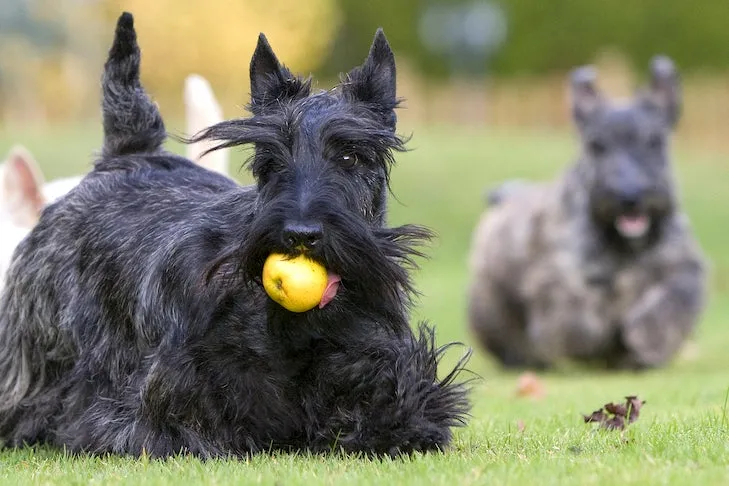 Scottish Terriers enjoying playtime in a grassy field.
Scottish Terriers enjoying playtime in a grassy field.
Cantaloupe
Low in calories and high in water and fiber, cantaloupe is a nutrient-dense fruit. However, its high sugar content means it should be offered in moderation, particularly for dogs who are overweight or have diabetes. Freezing small cubes of cantaloupe can create a fun and hydrating enrichment snack.
Cranberries
Both fresh and dried cranberries are safe for dogs in small quantities. While some dogs might not enjoy their tart taste, cranberries contain antioxidants. Be cautious with commercially dried cranberries, as many are sweetened and contain unnecessary sugar. Opt for unsweetened fresh or frozen cranberries if possible.
Cucumbers
Cucumbers are excellent for dogs, especially those who are overweight, as they contain very few carbohydrates or fats and are primarily water, offering satiating hydration. They are rich in vitamins K, C, and B1, as well as potassium, copper, magnesium, and biotin. Sliced and frozen cucumbers make a great cooling treat.
Mango
This juicy tropical fruit provides vitamins A, B6, C, and E, along with potassium, beta-carotene, and alpha-carotene. It is essential to remove the hard pit first, as it contains small amounts of cyanide and poses a choking hazard. Mango is high in sugar, so offer it as an occasional treat.
 Russell Terrier with funny expression, a slice of cucumber on its head.
Russell Terrier with funny expression, a slice of cucumber on its head.
Oranges
Veterinarians generally consider oranges safe for dogs, though their strong citrus smell and taste often deter canines. Oranges are a good source of vitamin C, potassium, and fiber. Only offer the juicy flesh in small quantities, ensuring all seeds and the peel are removed, as the peel is tough on their digestive system and contains oils that can cause upset.
Peaches
Fresh or frozen peach slices are a good source of fiber and vitamin A. Crucially, like cherries, peach pits contain cyanide. Always ensure the flesh is completely cut away from the pit, and dispose of pits securely where your dog cannot access them. Avoid canned peaches due to their high sugar syrup content.
Pears
Pears are a healthy snack, high in copper, vitamins C and K, and fiber. Always cut the pear flesh into bite-sized chunks and remove the pit and seeds, which contain traces of cyanide. Canned or jarred pears with sugary syrups should be avoided. For more general guidance on safe foods, refer to this list of what dogs can and cannot eat.
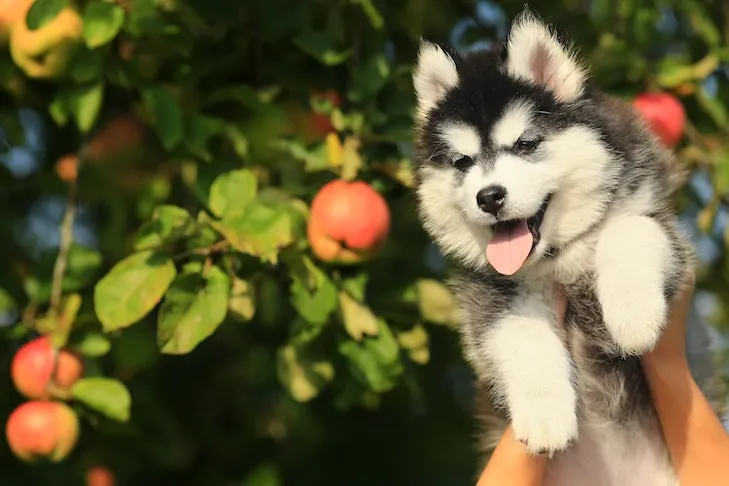 Adorable Siberian Husky puppy being held near an apple tree.
Adorable Siberian Husky puppy being held near an apple tree.
Pineapple
Chunks of fresh pineapple can be a sweet treat, provided the prickly outer peel and crown are removed. This tropical fruit is rich in vitamins, minerals, and fiber, and contains bromelain, an enzyme that aids protein absorption. As with other fruits, avoid canned pineapple in sweetened syrups.
Pumpkin
Pure pumpkin puree is an excellent food for dogs, known for its antioxidants and its ability to help relieve both diarrhea and constipation. When buying canned pumpkin, always choose 100% pumpkin puree, not pie filling. You can also roast pumpkin at home and feed the peeled flesh.
Raspberries
Raspberries are safe in moderation and contain beneficial antioxidants. They are low in sugar and calories but high in fiber, manganese, and vitamin C. Their anti-inflammatory properties make them particularly good for senior dogs struggling with aging joints. However, raspberries contain small, naturally occurring amounts of xylitol, so limit your dog to no more than 8 ounces of fresh or frozen raspberries.
Strawberries
Strawberries are packed with fiber and vitamin C, and even contain an enzyme that can help whiten your dog’s teeth. Like all fruits, they contain natural sugar, so offer them in moderation. Frozen strawberries make a fun enrichment treat.
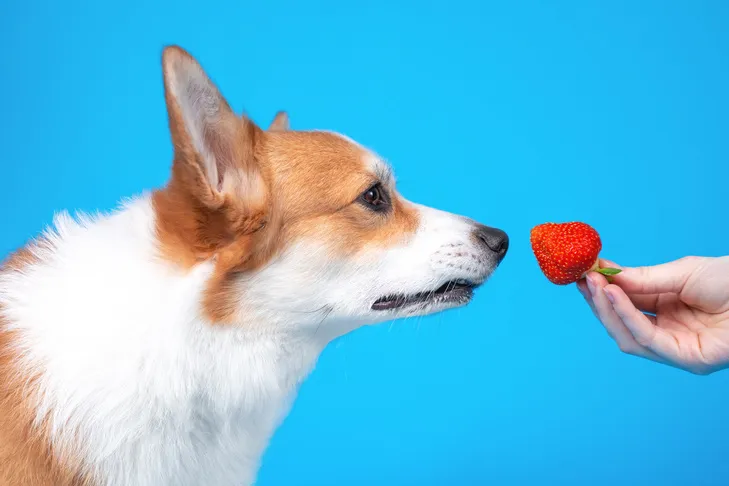 Pembroke Welsh Corgi curiously sniffing a fresh strawberry.
Pembroke Welsh Corgi curiously sniffing a fresh strawberry.
Watermelon
Watermelon is safe for dogs, but it’s crucial to remove all seeds and the rind, as they can cause intestinal blockages. The flesh is rich in vitamins A, B-6, and C, as well as potassium, and its 92% water content makes it a great hydrating treat on hot days. Freezing chunks of seeded watermelon can be a delightful summer snack.
What Fruits Are Dogs Not Allowed to Have?
While many fruits are healthy for humans, some contain compounds, seeds, or parts that are downright dangerous, if not toxic, to dogs. It is vital to keep these fruits completely out of your dog’s reach to ensure their safety. Knowing these can prevent serious health issues for your furry friend. If you’re wondering what human treats can dogs eat, it’s best to stick to verified safe options.
Avocado
Despite being a healthy snack for humans, avocado should never be given to dogs. The pit, skin, and leaves of avocados contain persin, a toxin that frequently causes vomiting and diarrhea in dogs. While the fleshy inside of the avocado fruit contains less persin, it can still be too much for some dogs to handle. Additionally, avocado flesh is high in fat, which can lead to gastrointestinal upset or contribute to serious conditions like pancreatitis if consumed in large quantities.
Cherries
With the exception of the ripe fleshy fruit around the seed, all parts of cherry plants – including the leaves, stems, and especially the pits – contain cyanide and are toxic to dogs. Cyanide disrupts cellular oxygen transport, preventing your dog’s blood cells from getting enough oxygen. If you have a cherry tree, ensure your dog does not have access to fallen fruit. Signs of cyanide poisoning include dilated pupils, difficulty breathing, and red gums, which constitute a veterinary emergency. When enjoying cherries, always dispose of pits securely in a dog-proof trash can.
Grapes and Raisins
Grapes and raisins are highly toxic to dogs, regardless of breed, sex, or age. The exact toxic substance is unknown, but even small amounts can lead to acute sudden kidney failure. If you suspect your dog has eaten any amount of grapes or raisins, contact your veterinarian immediately. Be extremely vigilant with this dangerous fruit, especially if children are present who might drop them. Always secure grapes and raisins in dog-proof containers or dispose of them where your dog cannot access them, including compost heaps.
Tomatoes
While the ripened flesh of a red tomato fruit is generally considered safe for dogs, the green parts of the tomato plant—including the leaves, stems, and unripe green tomatoes—contain a toxic substance called solanine. A dog would typically need to consume a large quantity of the plant material to become sick, but it’s safest to avoid tomatoes entirely to prevent any risk. If your dog enjoys exploring your garden, ensure they cannot access your tomato plants.
Vegetables Your Dog Can Enjoy in Moderation
Understanding which vegetables are safe and beneficial for your dog is just as important as knowing which fruits to avoid. Many vegetables offer valuable nutrients, but some can be harmful. Here are some dog-friendly vegetables you can share in moderation, typically chopped and plain. To understand the broader spectrum of safe foods, you might want to learn what normal food can dogs eat.
Broccoli
Broccoli is safe for dogs in small quantities and best served as an occasional treat. It’s high in fiber and vitamin C and low in fat. However, broccoli florets contain isothiocyanates, which can cause mild to severe gastric irritation in some dogs if consumed in large amounts. The tough stalks have also been known to cause esophageal obstruction. It’s often better to offer cooked broccoli to minimize these risks.
Brussels Sprouts
Loaded with nutrients and antioxidants, Brussels sprouts can be beneficial for dogs. However, moderation is key, as overfeeding can lead to excessive gas. If your dog enjoys them and you can tolerate the gaseous side effects, they can be a nutritious addition to their diet.
Carrots
Carrots are an excellent low-calorie snack, rich in fiber and beta-carotene, which converts to vitamin A. Chewing on this crunchy root vegetable also helps promote good dental health. Carrots are a common ingredient in many dog foods and treats.
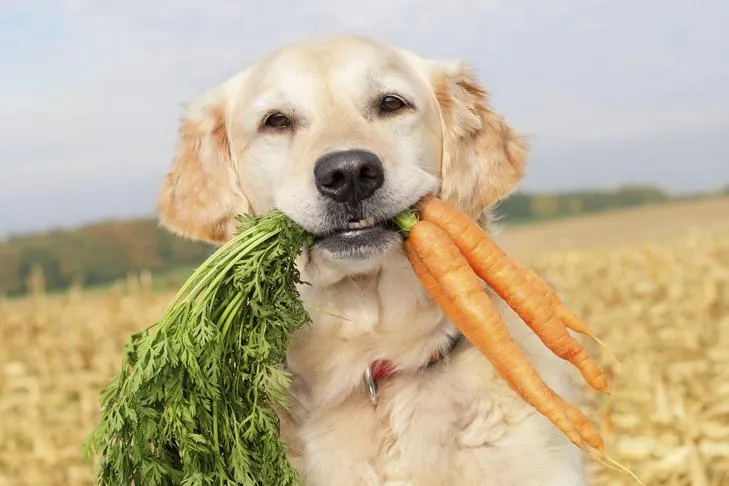 Golden Retriever gently holding several fresh carrots in its mouth.
Golden Retriever gently holding several fresh carrots in its mouth.
Celery
Celery provides vitamins A, B, and C, along with nutrients that can promote heart health and potentially help fight cancer. An added bonus is its ability to freshen doggy breath. It can be offered in small, chopped pieces.
Green Beans
Plain green beans – whether chopped, steamed, raw, or canned (no salt added) – are safe for dogs. They are packed with important vitamins and minerals, high in fiber, and low in calories, making them a great dietary supplement or treat. Frozen green beans can also be a fun, crunchy snack.
Peas
Green peas, snow peas, sugar snap peas, and garden or English peas are all generally safe for dogs in moderation. Peas are rich in vitamins, minerals, protein, and fiber. You can feed your dog fresh or frozen peas, but avoid canned varieties with added sodium.
Spinach
Dogs can eat spinach, but it’s not the top recommendation for a regular vegetable treat. Spinach is high in oxalic acid, which can interfere with the body’s ability to absorb calcium and may contribute to kidney damage if consumed in very large quantities over time. While a small amount is unlikely to cause harm, other vegetables offer more straightforward nutritional benefits without this caveat.
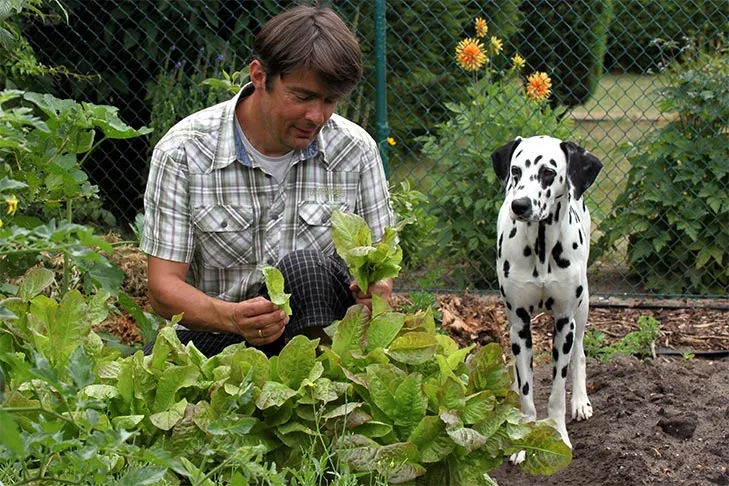 Dalmatian observing a man gardening and plucking leaves.
Dalmatian observing a man gardening and plucking leaves.
Vegetables Your Dog Should Avoid
Just as with fruits, while many vegetables can be a healthy addition to a dog’s diet, others are toxic or harmful. It’s essential to understand which vegetables should never make their way into your dog’s bowl.
Asparagus
While asparagus isn’t inherently unsafe for dogs, it offers little to no nutritional benefit to them. It’s too tough to be eaten raw, and by the time it’s cooked soft enough for dogs, much of its nutritional value is lost. There are many better, more beneficial vegetable options to share with your dog.
Wild Mushrooms
Wild mushrooms can be extremely toxic for dogs, and distinguishing poisonous species from safe ones can be very difficult for a non-expert. Even a small amount of a toxic mushroom can cause severe illness or death. Therefore, all wild mushrooms should be considered dangerous, and you should prevent your dog from foraging for them. Washed mushrooms purchased from a supermarket, intended for human consumption, are generally fine in small quantities. If you suspect your dog has eaten a wild mushroom, seek immediate veterinary attention.
Onions, Garlic, Leeks, and Chives
Dogs should never eat onions, garlic, leeks, or chives. These vegetables belong to the Allium family and are poisonous to most pets, especially cats. Consuming any of these can cause your dog’s red blood cells to rupture, leading to a condition called hemolytic anemia, and can also cause vomiting, diarrhea, stomach pain, and nausea. Poisoning from these ingredients can be more serious in Japanese breeds like Akitas and Shiba Inus, but all dogs are susceptible. Always ensure food containing these ingredients is secured and out of your dog’s reach.
Conclusion
Understanding “What Fruits Are Dogs Not Allowed To Have” is a critical aspect of responsible pet ownership. While a variety of fruits and vegetables can offer healthy benefits in moderation, many common human foods pose serious health risks to our canine companions. Always err on the side of caution. If you are ever unsure about a specific fruit or vegetable, it is best to consult your veterinarian before offering it to your dog. Prioritizing your dog’s safety and well-being means being diligent about their diet and knowing which items to keep strictly out of their reach. By following these guidelines, you can ensure your dog enjoys a diet that is both safe and nutritious. Read more articles about pet care on our website to ensure your furry friend stays healthy and happy!
